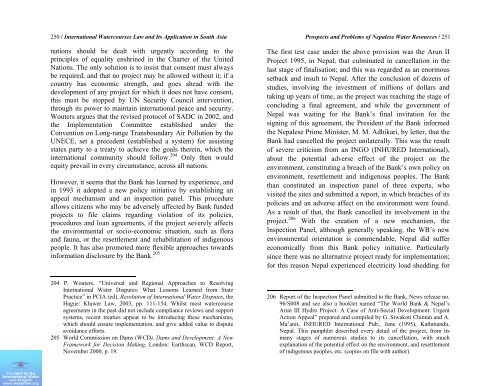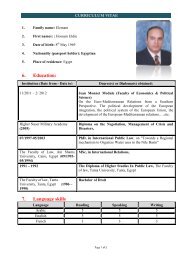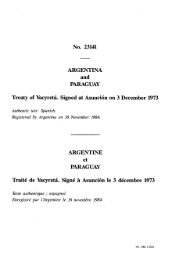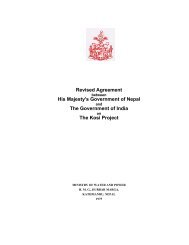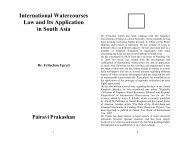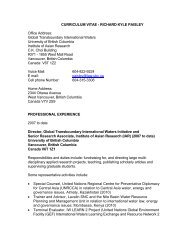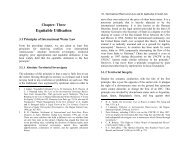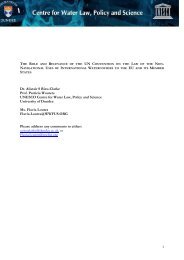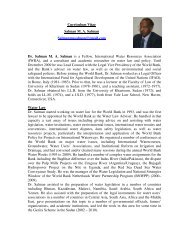Upreti, Trilochan, International Watercourses Law and Its Application ...
Upreti, Trilochan, International Watercourses Law and Its Application ...
Upreti, Trilochan, International Watercourses Law and Its Application ...
You also want an ePaper? Increase the reach of your titles
YUMPU automatically turns print PDFs into web optimized ePapers that Google loves.
250 / <strong>International</strong> <strong>Watercourses</strong> <strong>Law</strong> <strong>and</strong> <strong>Its</strong> <strong>Application</strong> in South Asia Prospects <strong>and</strong> Problems of Nepalese Water Resources / 251nations should be dealt with urgently according to theprinciples of equality enshrined in the Charter of the UnitedNations. The only solution is to insist that consent must alwaysbe required, <strong>and</strong> that no project may be allowed without it; if acountry has economic strength, <strong>and</strong> goes ahead with thedevelopment of any project for which it does not have consent,this must be stopped by UN Security Council intervention,through its power to maintain international peace <strong>and</strong> security.Wouters argues that the revised protocol of SADC in 2002, <strong>and</strong>the Implementation Committee established under theConvention on Long-range Transboundary Air Pollution by theUNECE, set a precedent (established a system) for assistingstates party to a treaty to achieve the goals therein, which theinternational community should follow. 204 Only then wouldequity prevail in every circumstance, across all nations.However, it seems that the Bank has learned by experience, <strong>and</strong>in 1993 it adopted a new policy initiative by establishing anappeal mechanism <strong>and</strong> an inspection panel. This procedureallows citizens who may be adversely affected by Bank fundedprojects to file claims regarding violation of its policies,procedures <strong>and</strong> loan agreements, if the project severely affectsthe environmental or socio-economic situation, such as flora<strong>and</strong> fauna, or the resettlement <strong>and</strong> rehabilitation of indigenouspeople. It has also promoted more flexible approaches towardsinformation disclosure by the Bank. 205204 P. Wouters, “Universal <strong>and</strong> Regional Approaches to Resolving<strong>International</strong> Water Disputes: What Lessons Learned from StatePractice” in PCIA (ed), Resolution of <strong>International</strong> Water Disputes, theHague: Kluwer <strong>Law</strong>, 2003, pp. 111-154. Whilst most watercourseagreements in the past did not include compliance reviews <strong>and</strong> supportsystems, recent treaties appear to be introducing these mechanisms,which should ensure implementation, <strong>and</strong> give added value to disputeavoidance efforts.205 World Commission on Dams (WCD), Dams <strong>and</strong> Development: A NewFramework for Decision Making, London: Earthscan, WCD Report,November 2000, p. 19.The first test case under the above provision was the Arun IIProject 1995, in Nepal, that culminated in cancellation in thelast stage of finalisation; <strong>and</strong> this was regarded as an enormoussetback <strong>and</strong> insult to Nepal. After the conclusion of dozens ofstudies, involving the investment of millions of dollars <strong>and</strong>taking up years of time, as the project was reaching the stage ofconcluding a final agreement, <strong>and</strong> while the government ofNepal was waiting for the Bank’s final invitation for thesigning of this agreement, the President of the Bank informedthe Nepalese Prime Minister, M. M. Adhikari, by letter, that theBank had cancelled the project unilaterally. This was the resultof severe criticism from an INGO (INHURED <strong>International</strong>),about the potential adverse effect of the project on theenvironment, constituting a breach of the Bank’s own policy onenvironment, resettlement <strong>and</strong> indigenous peoples. The Bankthan constituted an inspection panel of three experts, whovisited the sites <strong>and</strong> submitted a report, in which breaches of itspolicies <strong>and</strong> an adverse affect on the environment were found.As a result of that, the Bank cancelled its involvement in theproject. 206 With the creation of a new mechanism, theInspection Panel, although generally speaking, the WB’s newenvironmental orientation is commendable, Nepal did suffereconomically from this Bank policy initiative. Particularlysince there was no alternative project ready for implementation;for this reason Nepal experienced electricity load shedding for206 Report of the Inspection Panel submitted to the Bank, News release no.96/S008 <strong>and</strong> see also a booklet named “The World Bank & Nepal’sArun III Hydro Project: A Case of Anti-Social Development: UrgentAction Appeal” prepared <strong>and</strong> compiled by G. Siwakoti Chintan <strong>and</strong> A.Ma’anit, INHURED <strong>International</strong> Pub., June (1995), Kathm<strong>and</strong>u,Nepal. This pamphlet described every detail of the project, from itsmany stages of numerous studies to its cancellation, with muchexplanation of the potential effect on the environment, <strong>and</strong> resettlementof indigenous peoples, etc. (copies on file with author).


